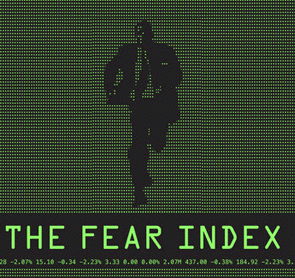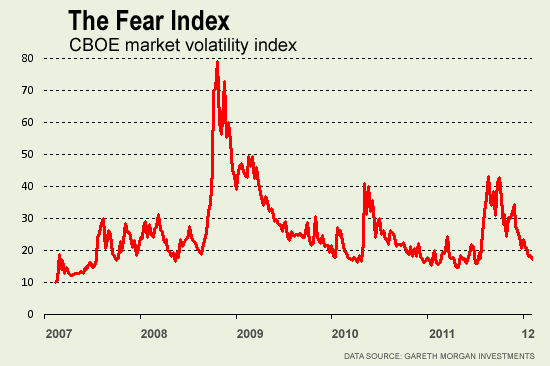
By John Carran*
One of the books I enjoyed reading over the holiday break was The Fear Index by Robert Harris.
It's a psychological thriller with the story revolving around a brainy investment fund owner who develops a computer programme to take advantage of fear in financial markets.
The computer programme makes billions, but in the process manufactures large scale fear and chaos of its own. The underlying message is about the amorality of financial markets and the dangers of creating computers that have minds of their own.
The title of Harris's book refers to a real life index called the Market Volatility Index, which trades on the Chicago Board Options Exchange.
It derives what option traders expect sharemarket volatility (the ups and downs in market prices) to be over the next 30 days - the greater the volatility, the greater the fear.
The chart below shows the Fear Index since 2007. As it shows, market fear was at fever-pitch during the Lehman Brothers' collapse in September 2008. It was white-knuckle in mid-2010 and mid-2011 as waves of panic gripped sharemarkets as a result of fears over the solvency of European countries.
In contrast to the protagonist in Harris's book, most investors, business owners, and workers lose when there is heightened fear in investment markets.
When fear is high businesses will put off investing in large irreversible capital projects and hiring new workers. This is because it is too costly to unwind those investments or sack workers should the economic environment turn out as bad as feared.

Investors will be reticent about buying shares in companies when their earnings prospects are wildly uncertain. They will demand a large premium on their returns before they consider buying shares.
This in turn will raise the cost of equity funding for companies, further discouraging capital investment.
This chain of fear-related investment and hiring inhibition has been happening since the global financial crisis that began in late 2007.
Initially the fear was of a huge contraction in credit available to businesses and households. The fears were eventually assuaged by central banks and governments flooding financial systems with funding, albeit with collateral damage to economies.
Latterly, the European debt crisis has reignited fears that the global banking system will crumble and economies wilt. The problems are deep-seated, residing as they do in unsustainable country debt burdens.
The political problems have been masked by a wall of European Central Bank money, which is keeping troubled European banks and sovereigns afloat. European countries have started to take meaningful steps to reform their moribund economies.
But risks and fears remain high.
Greece remains on the precipice of defaulting on its debt; its financial and economic position is hopeless. Further sizeable funding injections will be needed to support European banks and other wobbly countries like Portugal, Ireland, Spain and Italy.
This is uncharted territory, ripe for generating fear. Although the Fear Index shows a moderation in investor fear, other indicators of risk, such as the premium share investors require over safe securities like US Treasury bonds, remain high.
Although down here in Godzone we're doing better economically than many other developed countries, the fear in Europe and elsewhere is transmitted to us through our connections with global financial markets and trade linkages.
Global fear has been having a deleterious effect on New Zealand business investment, which has fallen as a share of gross domestic product to lows last seen in the early 1990s.
There have been some recent signs of labour market recovery, but progress has been slow.
So what can pull us out of this gloom? In contrast to households and governments, businesses have generally been improving the strength of their financial positions as they have shed jobs and improved efficiency.
More convincing signs that Europe is getting a handle on its debilitating sovereign debt burden would go a long way toward calming palpitations.
This will entail further tough and wrenching decisions to be made by European politicians and voters.
But if we see progress in this area, we will see big sighs from businesses, which will start to invest and plan for future expansion. This will be the biggest single factor that unleashes sustained economic recovery globally and in New Zealand.
-----------------------------
John Carran is a senior economist at Gareth Morgan Investments.
This story first appeared in the NZ Herald, and is used with permission.
We welcome your comments below. If you are not already registered, please register to comment
Remember we welcome robust, respectful and insightful debate. We don't welcome abusive or defamatory comments and will de-register those repeatedly making such comments. Our current comment policy is here.